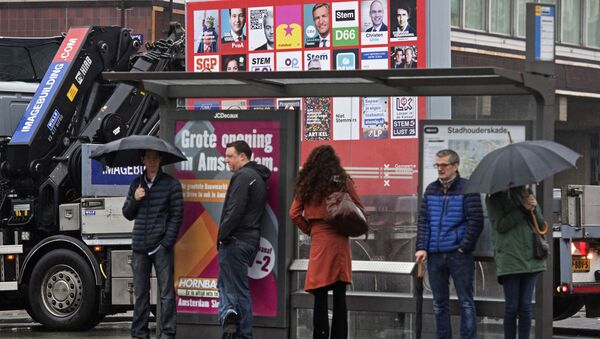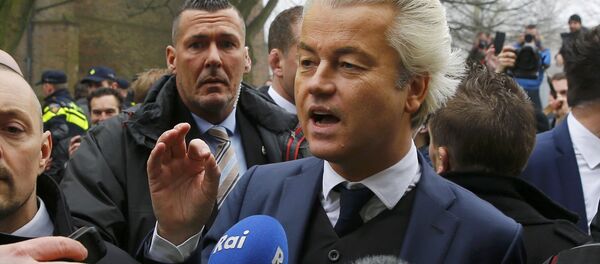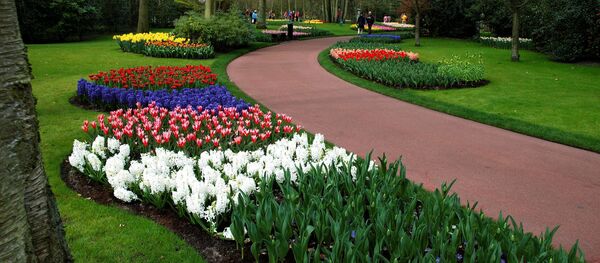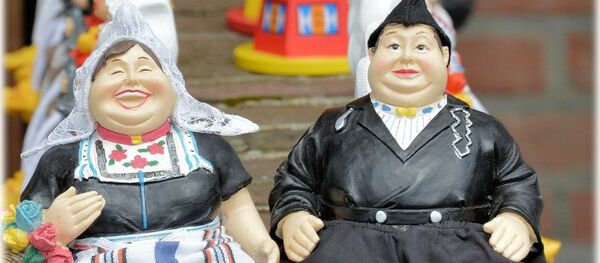Until recently, Wilders' anti-immigration Party for Freedom (PVV) was leading opinion polls. However, a new poll shows Wilders falling behind incumbent Prime Minister Mark Rutte of the center-right People's Party for Freedom and Democracy (VVD), who leads a coalition with the center-left Labor Party (PvdA).
According to the Peilingwijzer aggregate of polls released Wednesday, the ruling VVD is currently supported by 16.3 percent of voters, while support for the PVV has dipped to 15.7 percent.
Rinus van Schendelen, Emeritus Professor of Political Sciences at Erasmus University Rotterdam, told Sputnik Deutschland that the race is quite unpredictable because swing voters constitute most of the Dutch electorate.
"The electorate is very mobile, very volatile; anything can still happen. In the 2012 elections, the PvdA only reached second place in the last two weeks. Prior to that, the forecasts said that it would end up in 4th or 5th place. The central point is that the Dutch electorate does not have party loyalties. Only about 15 percent of voters are loyal to one party. Of the other 85 percent of the electorate, 25 percent usually stay at home. So there is an open electorate of 60 percent that can go to any party," van Schendelen explained.
Unlike countries such as Germany or Russia which require a party to get 5 percent of the popular vote to qualify for parliamentary seats, the Dutch system simply divides the number of votes by the number of seats in the House of Representatives. So, in order to be allocated one of the 150 seats, a Dutch political party needs to get a mere 0.67 percent of the public vote.
"I think the PVV and Wilders will be in second or third place and get 25 seats out of 150," van Schendelen explained.
The reason for this is that the core campaign issues of Wilders' party, Euroscepticism and fighting immigration, are not currently a priority for the electorate in the Netherlands, where the political discourse in the run-up to the elections has been dominated by other issues.
"At the moment, election debates are hardly touching on the European Union and migration. That is very odd. The political debate which is currently taking place on television, radio and other media revolves around questions of domestic politics, for example pensions, education, and care for the unemployed."
While Wilders is known for anti-immigrant and anti-EU rhetoric, Schendelen added that the established political parties have also toughened their stance.
"Domestic politics are dominating at the moment, but of course this can change over the last two weeks. With regard to migration and Europe, we see that the established political parties have become more critical and skeptical."
The PVV is the only party calling for the Netherlands to leave the EU, but many parties are calling for EU reform. Since most other EU member states share this desire for reform, the Dutch government is keen to lead efforts to forge a new EU Treaty, Schendelen said.
"The core concept of the new initiative is a 'head group.' In the case of a new treaty, this lead group creates a consensus and the other Member States are invited to follow. Our Prime Minister Rutte has said that Holland wants to be in this lead group. At the same time, he said that we will have to support fewer of Brussels' initiatives on migration, the free movement of people, the labor market and the financial industry."
Schendelen said that the 32.2 percent of voters who turned out for the referendum were more motivated by domestic than foreign policy and Ukraine is of little concern to them.
The referendum was held after the Consultative Referendum Law entered into force in July 2015, which allows a national, non-binding referendum to be triggered if a campaign has 300,000 signatures.
The law was initiated by the left-wing PvdA D66 and the Greens, who have since done a U-turn on the referendum issue.
"The House of Representatives made a big mistake. The initiators of this referendum – the Labor Party, D66 and the Greens – have made this clear and already said that this referendum law should be changed. They said, 'That was a mistake, never again!' They simply had not thought about the consequences of such a referendum," Schendelen said.
Never miss a story again — sign up to our Telegram channel and we'll keep you up to speed!





